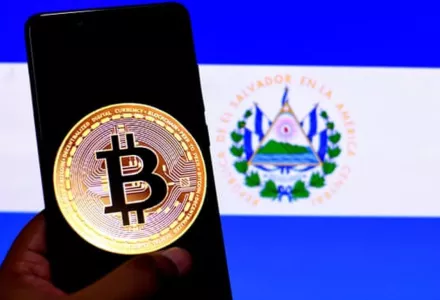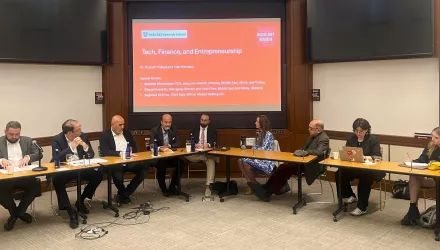
El Salvador this month became the first country to adopt a cryptocurrency – in this case, bitcoin – as legal tender. I say the first because others might follow. But they should think twice because the idea is highly dubious – and likely to be economically dangerous for developing countries in particular.
I will admit that I don’t understand the need for cryptocurrencies at all. Like many economists, I fail to see what problem they solve. They aren’t well designed to fulfill any of the classic functions of money – a unit of account, store of value, or means of payment – because their prices are so extraordinarily volatile. This volatility is not surprising, because cryptocurrencies are backed neither by reserves nor by the reputation of a well-established institution, such as a government or even a private bank or other trusted corporation.
In fact, bitcoin and its fellow cryptocurrencies were born from an anarcho-libertarian distrust of central banks. True, many central banks, especially in developing countries, have a history of debasing their currencies. But adopting bitcoin as legal tender makes little sense for El Salvador.
In 2001, El Salvador adopted the US dollar as legal tender to ensure the monetary stability that the country’s national currency, the colón, had historically failed to deliver. The reform worked: the country’s annual inflation rate, which had substantially exceeded 10% between 1977 and 1995, has declined markedly since the adoption of the dollar. It has been below 2% since 2012, and close to zero since 2015 – a rarity in Latin America.
Giving up the monetary independence afforded by issuing one’s own currency carries costs – particularly, the loss of the ability to adjust monetary policy in response to local economic conditions. El Salvador already accepted this when it adopted the dollar. The costs would be even greater if a currency as unstable as bitcoin were the sole national currency. But President Nayib Bukele instead decided to designate both bitcoin and the dollar as legal tender. The logic behind that decision is surreal.
Bitcoin has not been well received in El Salvador. Domestic residents don’t want to be obliged to accept it. International markets also are unenthusiastic. Moody’s downgraded El Salvador’s debt in July, and S&P could follow suit. The spread between the interest rate that the government must pay on its debt and the US Treasury rate has increased sharply since the plan to bitcoinize was first announced in June.
There is one function that cryptocurrencies do appear to serve: facilitating illegal transactions. Needless to say, this is not a use that should be encouraged. Even worse in terms of the general welfare, “mining” cryptocurrencies such as bitcoin – which relies on blockchain technology to verify transactions – requires staggeringly large amounts of energy and thus harms the environment.
Moreover, even if one accepts a role for one or two cryptocurrencies, the number that has been created is bafflingly large: anywhere from 6,000 to 11,000 (or as many as 70,000 digital tokens). The entire notion of the usefulness of money is that people choose to use the same currency that others do, thereby minimising transaction costs. They can’t evaluate and keep track of the creditworthiness of dozens of issuers. Money is a sort of natural monopoly, which is why governments long ago took over responsibility for its provision.
In the mid-19th-century US, for example, private banks and other institutions issued an estimated 8,000 competing private currencies. As US Federal Reserve governor Lael Brainard has noted, that period “is now notorious for inefficiency, fraud, and instability in the payments system”. This is essentially why central banks were created.
The logic that works against a large number of currencies at the national level also applies internationally. This is one reason why the dollar remains by far the leading global currency. The world does not have room for 11 international currencies, let alone 11,000.
If the chronic US fiscal and current-account deficits had resulted in a strong long-term downward trend in the dollar’s value, one could imagine people shifting away from the greenback and seeking alternatives. But this has not happened, and particularly not during the period in which cryptocurrencies have risen. And US inflation was remarkably low during this time (though lately, it has risen in tandem with the economic recovery).
Some, including Bukele, claim that cryptocurrencies will bolster financial inclusion by giving unbanked people access to financial services and lowering transaction costs for small cross-border payments such as migrants’ remittances. The latter is particularly important to El Salvador, having averaged about 20% of GDP annually over the past two decades.
But bitcoin is unlikely to be the solution. Other means of bringing down such transaction costs appear more promising. And holding or transacting in such an unstable asset is a particularly bad idea for people with low incomes, who can ill afford to sustain price swings as large as 30% in a single day. Bitcoin has quadrupled in price over the last year, which is part of the attraction. But what goes up also comes down.
Another disadvantage is that even the digitally savvy run the risk of forgetting passwords and losing their bitcoin. And at least half of El Salvador’s population have no access to the internet in the first place.
Many aspects of cryptocurrencies are baffling, not least the success of a joke such as Dogecoin. But El Salvador’s adoption of bitcoin as legal tender is perhaps the strangest and potentially most worrying example of all.
Frankel, Jeffrey. “El Salvador’s Adoption of Bitcoin As Legal Tender Is Pure Folly.” The Guardian, September 24, 2021




